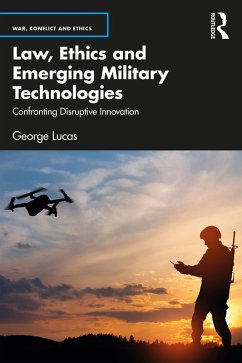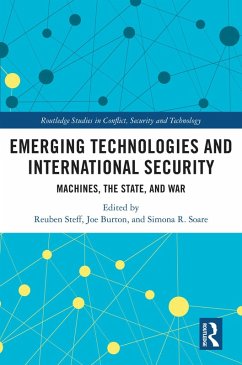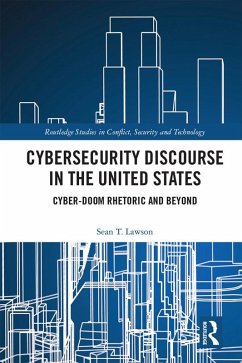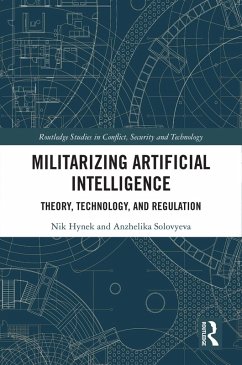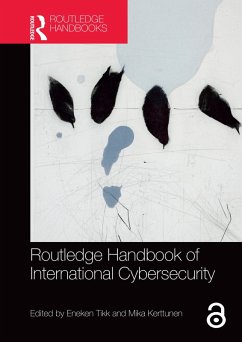'We live in a world in which technological development threatens to outpace both the legal and ethical frameworks which define the boundaries of what is acceptable. Established principles can seem outmoded, or even obstructive, when set against the siren attractions of new discoveries. Nowhere is this divergence more acute - or more relevant - than in the field of emerging military technologies. It is therefore essential that those with deep experience of the law, ethics and technology encourage us all to pause and reflect on the likely consequences of these transformative scientific discoveries. It is not enough to wait and see what these consequences will be. Nor is at an exaggeration to say that these consequences could be so far
reaching as to cause us to question what it is to be human and the value we place on human life. This is therefore a very timely book which deserves to be widely read by all those involved in any way in the development and implementation of emerging military technologies.'
Air Commodore John Thomas RAF (Retired),
President, International Society for Military Ethics in Europe (Euro-ISME)'I am delighted to be able to endorse this book. There are two main reasons for this. First, I have known George's work in the area of cyberwar and autonomous weapon systems for two decades now. In his work, George combines excellent analytical insights, the highest level of scholarly research with an in-depth knowledge of the defence and military organisations, and the relevant technology he writes about. This is a great element, as most of the work in this area is often anecdotal research-wise and superficial in terms of the proposed analysis. The depth of George's publications alongside their clarity and linearity makes them an almost-unique contribution to this field of work. They appeal to experts both academics and practitioners as well as to students and junior researchers who want to delve into this area of work. The second reason is that his books and publications thus far have been seminal, and I believe this will also be the case for this book. This is because the book has a very impressive breadth covering from cyber to kinetic uses of digital technologies and focusing on the entire spectrum of ethics and governance from procurement to deployment. The questions that it addresses are central to the debate on the ethics of war as well as to effort to regulate state use of digital technologies for defence purposes... I could not recommend this book more.'
Mariarosaria Taddeo,
Associate Professor and Senior Research Fellow, University of Oxford, UK'Finally, here is a book that unifies the fierce but siloed debates over military robotics, AI, and cyberwarfare-connecting the dots, which aren't obvious. These revolutionary technologies are so crucial to the future of security and defense, well into the next century if not more. The author is one of the very few who could pull this off; he was there at the start of these debates, not only as an academic philosopher and military historian, but also in the trenches of international policy discussions and military operations. In this book, theory meets real-world practice.'
Patrick Lin,
California Polytechnic State University, San Luis Obispo'Blending real-world insights with a thought-provoking advancement of human-centered ethical frameworks for conflict involving next-generation robotics, autonomy, and other breakthroughs, this book offers a vital contribution to the study of future warfare.'
August Cole,
non-resident Senior Fellow at the Atlantic Council, Washington D.C'I've had the great pleasure of working with and learning from Professor George Lucas for many years. His reputation at the service academies and, more broadly, within professional military education is beyond peer. His decades of research and writing have had a major and lasting impact on curricula worldwide. This book
is destined to be required reading for leaders, practitioners and even those with a casual interest in the field. Built upon years of scholarship enabled by a network of subject matter experts and the financial support of the Peace Research Institute Oslo, this book reflects on the leading edge of emerging military technologies. Few understand the ethical implications of emerging military technology in the way George does. As only an ethicist writing from experience within the institutions charged with grounding practitioners in tactics, techniques and procedures regarding emerging military technologies could do, George Lucas clearly describes the trends associated with postmodern war and the implications for systems associated with its execution. His particular expertise in cyber operations figures prominently in this book and will introduce the reader to new and important insights. George's concluding chapter, however, makes this book stand apart. His deep connections with private sector leaders engaged in weapons development render fresh, uncommon perspective from key stakeholders in emerging technologies. Defense contractors and engineers are rarely asked about the moral implications of their efforts. Professor Lucas ensures their concerns are accounted for in this evolving and fascinating field.'
Joseph J. Thomas,
United States Naval Academy, Annapolis, USA'Defence and security professionals, policymakers, legislators, computer engineers, and all those interested in ethics, law and emerging military technologies, want to know where consensus is emerging around ethical norms that will serve for adequate governance. Prof Lucas's discernment of eleven principles is a potentially break-through advance that lays out "soft-law" guidelines - ranging from mission legality and a presumption against unnecessary risk to meaningful human control, product liability, reckless engagement, and more. Foresight and warning in this field is difficult enough. This formulation of principles for engineering and research capable of attracting assent, and emerging from wide-ranging research, is simply brilliant.'
Esther D. Reed, Professor of Theological Ethics, University of Exeter, UK'The disruptive and destabilizing impact emerging military technologies such as cyberwarfare and autonomous weapons systems will have on the conduct of conflict and combat is commonly presented by either those who wish to restrict their use or those who argue as to why their development is essential for national and international security. With a long distinguished career teaching ethics and
international humanitarian law (the law of armed conflict) to present and future officers in the U.S. Navy, George Lucas is singularly gifted to embrace and bridge this tension, while elucidating potential pathways forward. Unfortunately, recent events have underscored the inevitability of hellish high-tech conflict. George Lucas serves as our Virgil guiding us through the landscape of emerging military technologies with astute sensitivity as to how a degree of morality can be introduced into this worst of human habits.'
Wendell Wallach, Senior Fellow at the Carengie Council for Ethics in International Affairs, Senior advisor to The Hastings Center, and scholar at Yale University's Interdisciplinary Center for Bioethics, USA'This book engages the mind-bending ethical complexities of emerging technologies that compels the reader to ask the penetrating questions of moral agency. Dr. Lucas's work complements the prescient tasks of technology's impact on moral decision making. How far will technology erode humanity's control of it? We do not have an ethics gap with technology innovation - we have an abyss between our regressing ethics and the exponential innovation of technology. Lucas, noting the "devaluation of norms" across the world, calls for an increased emphasis on ethics education, which often supersedes law. Laws are becoming a new moral baseline, where the practice of laws and ethics should be separate. Laws are there for those who do not have a strong grasp on morality and must be coerced by laws into doing the minimum. This cannot be the case when designing new weapons systems. Developers and engineers have an obligation to incorporate ethical frameworks in the process.'
Thomas E. Creely, Creator and Director of the Ethics and Emerging Military Technology Graduate Certificate Program at the U.S. Naval War College, Newport, RI'George Lucas grapples with the profound ethical and legal challenges posed by contemporary armed conflict. An impressive and highly readable book on urgent topics such as robots, autonomy, AI, and cyberspace.'
Lonneke Peperkamp, C
hair in Military Ethics and Leadership, The Netherlands Defense Academy, Netherlands'George Lucas has provided an ambitious and penetrating analysis of the legal and ethical dimensions of technologies that are reshaping the nature of modern military operations. He assesses the complex potential consequences of these technologies not only for society but for those who are involved in developing and deploying them. The result is a rich and deeply insightful work that draws on multiple disciplines to provide valuable guidance.'
Mitt Regan, McDevitt Professor of Jurisprudence, Georgetown University Law Center, Washington, USA'George has done an outstanding job of taking the enormous body of literature on the topic of emerging military technology and developed a framework for understanding. He also does a superb job helping the reader grapple with the differences between human morality and the legal adherence that one would imagine should be built into emerging military technologies. His is a must read for people who want to think seriously about how technology should be used in warfare.'
Rear Admiral Margaret "Peg" Klein (USN Retired), Dean of the College of Leadership and Ethics at the US Naval War College in Newport, RI, USA 'All in all,
Law, Ethics and Emerging Military Technologies is an excellent contribution by a technological optimist who believes that engineers and scientists can incorporate legal and ethical constraints into machines. With this book, Lucas offers a helpful framework and urges them to do so.'
Audrey Kurth Cronin,
Science, December 2022





